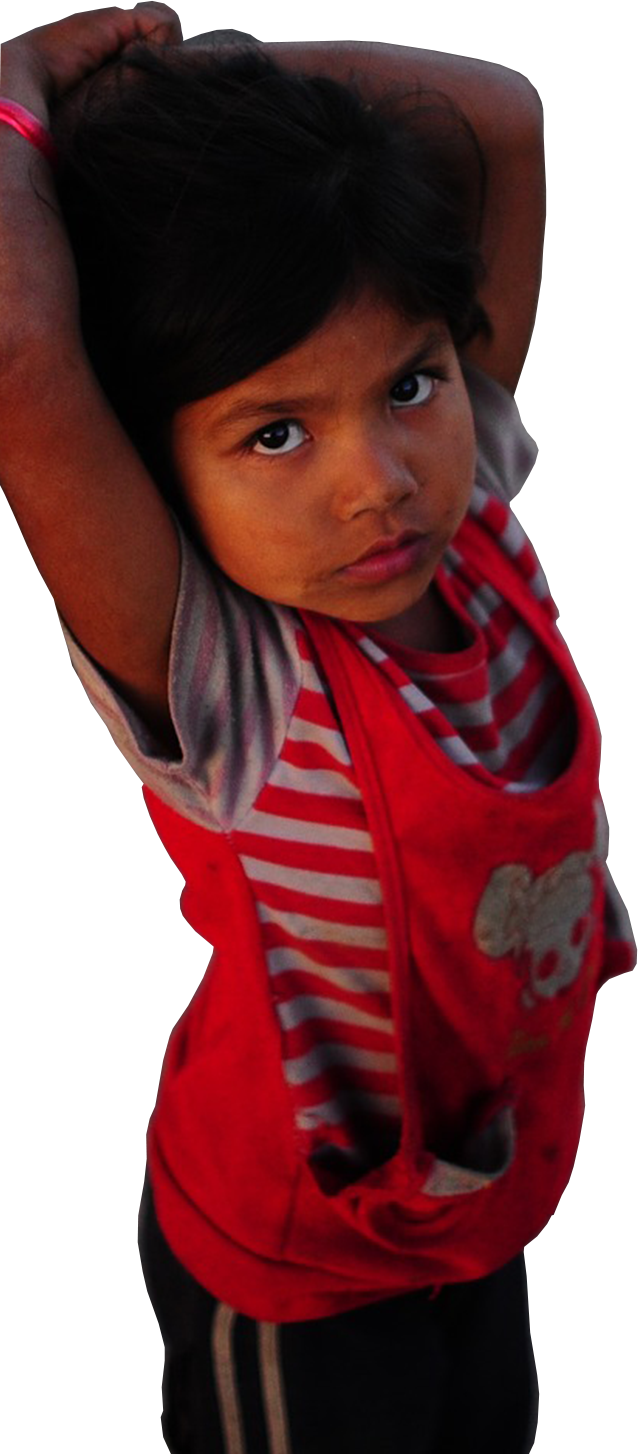

Child diaries
-
Non-Formal Education (NFE)
Manu, lives at Crawford Market with a group of boys. Before coming to Mumbai, he used to graze cattle at his village in Uttar Pradesh. His family owns a farmland and a herd of cattle there. He wanted to go to school like other children. However, despite his unwillingness, he had no choice but to look after the cattle. Attending school was something he could only dream of. One fine day, he fled his home and landed up in the streets of Mumbai. This was around year 2000-2001.
In Mumbai, he took up rag-picking to survive. His desire to study was shelved until he came in contact with the workers of Vatsalya Foundation. They motivated Manu to attend classes at the centre and he came along with other children. He regularly attended the classes at the centre. It did not take long for him to read, write and learn other things taught at the centre. He was very happy with this achievement.Timely help from Vatsalya Foundation has resulted in a much better future for Manu than what he could have achieved on the streets of Mumbai.
-
Formal Education
Sankita was born on the streets of Mumbai to a poor family who could not afford a better life. Her father is a porter. Sankita lives with her parents and two brothers on the footpath next to the G.T. Hospital.
Sankita was barely 8 years old when she came in contact with the organization in the year 1998. She attended the centre regularly and gradually enrolled in a school for formal education. She liked studies. Being a smart and intelligent girl, she completed the 7 th standard at Lord Harrison Municipal School without any hitch. However, continuing education after 7 th was a problem for her since her family’s economic condition was not good and the secondary school was located at a far away place. Hence, there was no choice for Sankita except to discontinue her schooling.
The workers of The Vatsalya Foundation tried to persuade her to continue education. They also tried to motivate her parents through continuous counselling sessions. During the counselling process, Sankita expressed her desire to be a nurse, a life with some stability and dignity.
The Vatsalya Foundation tried to motivate her to pursue her dream and made her realise the importance of education in her life. She learnt from the workers that she did not possess the minimum eligibility criteria for the nursing course. Though the desire to become a nurse was present, it was the motivation provided by VF, which made her consider studying for it. Timely counselling helped her from being a drop out and lead life in misery without pursuing her dreams.
-
Skill Training
Babita, a 12-year-old girl stays with her brother, as her parents are dead. Her father was an alcoholic and his life ended due to that very reason. Chronic illness claimed her mother’s life. Babita and her brother make a living by selling empty oil tins. They buy empty oil tins from shops at a lower price and sell it after cleaning, for a moderately higher price of around Rs. 5 /- for a tin. Babita came in contact with Vatsalya Foundation in 2003. Time went by and gradually she started taking interest in beadwork. She liked the work and enjoyed making malas, bracelets and rings. Through different designs and colours, she unleashed her creativity. Now she not only learns the intricacies of the beadwork but also teaches other children.
Babita enrolled in tailoring too, which will complement her income. She is determined to be self-employed by using these acquired skills and dreams of a better life.
-
Healthcare
Ankit lost his father – a victim of alcoholism, around 5-6 years back… They used to live at Wadala and his father used to do odd jobs for a living. After his father’s death, his mother started living with another person. Since his relatives had their own problems to address, he was left alone with no one to support him. He started residing with a group of boys at Carnac Bunder area. He does not have any contact with his mother though he knows where she stays. By some means Ankit had to survive and like many other street children he took up rag picking to survive without realizing its repercussions. After a while, he developed skin disease. Due to lack of any care and treatment, it infected his whole body.
Ankit was in touch with the contact centre since 2002. The contact centre workers spoke to him regarding the treatment. He did not want to get hospitalized and treated since there was no support for him. Somehow the workers managed to convince him and he was sent to G.T. Hospital, where he was treated for 15 days. As expected, his relatives were not bothered.
However, Vatsalya Foundation’s workers spoke to Ankit’s relatives in the hope of securing their support. Due to their efforts, his relatives assured help to Ankit in terms of care during his treatment. After sustained efforts, Ankit got cured. The heartening part is that his relatives appreciated the organization’s work.
-
Referral to the Shelter
Life in the streets was not easy for Rani. Her handicapped father begged in the streets and her mother worked as a domestic help to run the household, which consisted of 4 brothers and two sisters. They lived at Crawford Market. Rani used to study in at a nearby school and was also attending the classes run by the contact centre regularly. She was good at studies and enthusiastic about learning.
Her father’s death (6 months back) and mother’s involvement with another man made life even more tough. Her elder brothers were living separately. Her mother did not have time to take care of her. She started feeling desolate and insecure. Her younger sister Rati, was also in the same state. The teachers / workers at the centre noticed the change in Rani’s behaviour. She was withdrawn.
The Vatsalya Foundation had a discussion with her mother about Rani’s situation. Her mother expressed her inability to take care of the daughters and was keen to send them to a boarding school. The girls were also consulted about this. They too expressed their willingness to go to a boarding school.
They are doing well now. Life at the shelter is far different from their life on the streets. They live in a better environment, away from the hustling bustling crowd, frequent fights, ruffians, drugs and anti-social elements. They can look ahead to a good future.
-
Repatriation
Cities have a fatal attraction. Mumbai, being the dream city, attracts lot of people from villages in the hope of leading a better life. A small percentage manage to improve their standard of living but a majority live in a miserable condition. Many meet premature death because of poverty, poor living condition and addiction to narcotics.
Ankita belonged to one such migrant family. Her parents had a small piece of farmland and a house at their village in Uttar Pradesh. However, the farmland did not provide enough to sustain the lives of a fourteen-member family. Ankita was the eleventh child of her parents and she had a younger brother too. She had migrated with her parents to Mumbai in 1996. Since then Crawford Market became her home.
She lost her father, who was suffering from tuberculosis. Her elder brothers had started living separately. Two of her sisters got married. Ankita was forced to beg to meet the daily needs of the family along with her younger brother. Though Ankita was in contact with the centre, she was not regular. Very often, one would meet her at the outreach points like railway station, market place, etc. where she generally spent time.
The workers spoke to Ankita’s mother and discussed their problems. They had a farmland and home at their village and most of her sons were managing their lives themselves. TVF staff motivated Ankita’s mother to go back to the village and work there instead of living on the street and exposing herself as well as her eleven-year-old daughter to all sorts of exploitation.
Counselling on a regular basis helped Ankita’s mother see reason and take the decision of going back to her village.
-
Group Home
Farid, Taufiq, Kamruddin and Bashir were living on the streets of Crawford market. Farid, 20, works in a cutlery shop and eared Rs. 1700/- per month. Taufiq, 15, did catering work and manages to earn enough to meet his food expenses, entertainment and gambling. Kamruddin, 15, and Bashir, 14, are also involved in catering work.
Farid was counseled to stay in a group home rather than living on the streets. The staff of TVF coordinated between the four youth. After individual counseling and discussion with them, they were ready to stay together in a rented room. It made economic sense and moreover, they were from the same village. TVF workers guided them in finding a suitable room in their budget. Finally they managed to get a room at P.D’mello road by paying Rs. 5000/- as the deposit and Rs. 600/- per month as rent. All of them contributed for the deposit and other requirements.
Living together in a group home was so much better than living on the streets. They do visit their village in West Bengal occasionally.
-
Repatriation
Salma chose to live alone in the streets of Crawford Market rather than stay with her mother and stepfather. For an eighteen- year-old girl, the street was too dangerous, filled with anti-social elements. Salma had a difficult family as well as personal life. Her father, who was a drug addict, had expired 6 years back. She stayed with her mother, who worked as a domestic helper, along with Salma’s two younger sisters. The problem erupted when her mother started living with another person in a rented house at Mahim. Her mother and her companion were not ready to take the responsibility of Salma and her siblings. Salma was a regular student at the South Mumbai centre of The Vatsalya Foundation. Her two younger sisters were also admitted to a shelter. However, Salma was sent home because of her irresponsible behaviour and corruptive influence over the other girls. She stayed with her mother for few months but both mother and daughter did not get along with each other. Her mother was keen to send her back to a shelter. Being an older girl it was difficult for her to join the shelter. The workers of VF contacted Child Welfare Committee and put Salma in a rescue home. She could not adjust to the life there. After five days of stay, Salma returned to the streets. She was advised to stay with her mother but she declined, expressing her discomfort with her mother’s companion. She did not feel safe with him. So, she opted to stay alone.
Salma became a part of the street life. She started having relationships with boys from the street. Living alone in the streets meant preparing oneself to encounter all sorts of unexpected events. Being a young girl, the problems were even more. The most difficult thing was to deal with the unwanted sexual advances of boys and men. There were significant changes in Salma’s behaviour and body language. Rudeness had crept into her behavior and she became more aggressive and moody.
Considering her vulnerability, the workers contacted Salma’s mother and persuaded her to take Salma’s responsibility. Mother agreed and Salma started living with her. Over a period of time, problems between Salma and her mother were sorted out. Her life had become normal after years of turmoil. Regular counseling had brought changes in both mother and daughter and enabled them to lead better lives.
